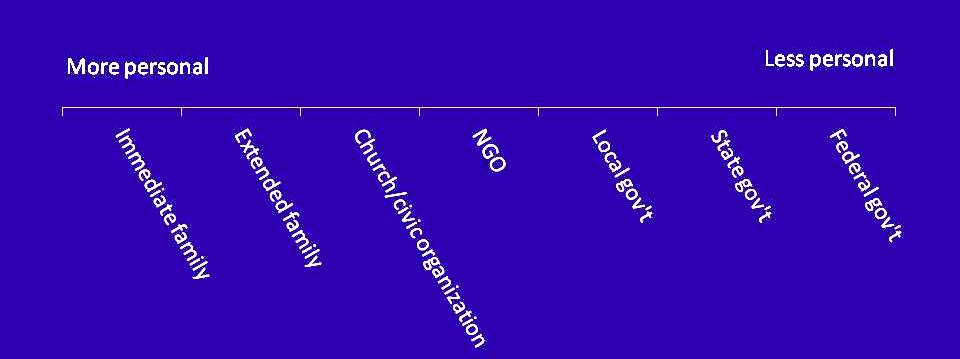In his book, The Tragedy of American Compassion, Marvin Olasky suggests seven marks of compassion. Taken together these add powerfully to our view and practice of biblical social justice.
Social Justice and Affiliation
The first mark is affiliation, defined by Webster’s 1828 as “adoption; association in the same family or society.” Affiliation is rooted in the nature of God, in the relationship inherent in His three-in-one being. This concept of God in relationship within Himself establishes the importance of human relationships.
 One of the greatest causes of poverty is disaffiliation, separation of families and communities. Spouses divorce. Men abandon their families. Absent fathers neglect child payments. Children run away from home.
One of the greatest causes of poverty is disaffiliation, separation of families and communities. Spouses divorce. Men abandon their families. Absent fathers neglect child payments. Children run away from home.
Poverty workers 150 years ago regarded affiliation as of first priority. They recognized the need to understand who the individual is. Who is their family? What church do they belong to? What club are they a member of? The first line of defense to help people out of poverty was to restore, to the extent possible, their affiliations.
Other practices by the “poverty industry” disaffiliate poor people. Welfare programs that reward single women for having children discourage marriage, thus destroying affiliation. Child sponsorship programs that give directly to the child undermine the father’s role as breadwinner. The child looks to the NGO, rather than to the father, for resources. Much better are child sponsorship programs directed to the family and the community.
Affiliation occurs at multiple levels, from the more personal to the less personal. As indicated in the graphic below, the most personal is immediate family, while federal government is the least. Extended family, church (or civic organization), private charitable organizations (NGOs) and local and state governments fall between. It is important to note that as we go higher on this list, the solution is more impersonal and the disaffiliation greater. The federal government, often seen as the first line of defense, should actually be the last resort. Poverty is almost never solved by government efforts.
Social Justice and Bonding
Olasky’s second mark is bonding. When re-affiliation is impossible bonding must occur. New relationships must be built.
The ultimate picture of bonding is described for us in John 1:14: The Word became flesh and made his dwelling among us. (Joh 1:14 NIV) The incarnation is perhaps the absolute manifestation of God’s compassion. To become incarnate, Christ had to leave heaven and eternity and come and live “among us.” Jesus gave the final word on relationship, on “suffering together with.”
The Big Brothers/Big Sisters program serves as a good example of bonding. Volunteers become a Big Brother or Big Sister to children who are struggling, those without a mother or father. The volunteers come alongside and build relationship, and bonding results. Another example is the Hunger Corps program within Food for the Hungry. Hunger Corps teams live in villages and communities in developing countries, build relationships, and bond with the people. The scale is small and personal rather than large and impersonal. Food for the Hungry founder Larry Ward used to say “They die one at a time; you can help them one at a time.” This is life-on-life compassion.
A Chinese proverb captures this well:
Go to the people Live among them Learn from them Love them Start with what they know Build on what they have; But of their best leaders When their task is accomplished Their work is done The people all remark, “We have done it ourselves.”Bonding provides for people’s lives to touch each other in new and dynamic ways.
– Darrow Miller







5 Comments
Jon
January 7, 2013 - 9:00 pmIt’s almost like God had a plan when he made the family the basic unit of society! 🙂
admin
January 8, 2013 - 8:56 amYes, Jon, another example of how truth comports with reality!
Thanks for your response. Blessings.
Gary Brumbelow